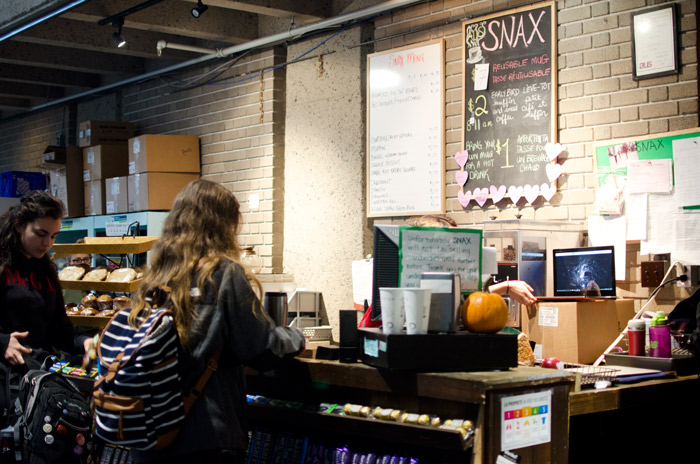After a six month ban, students may once again be able purchase sandwiches from SNAX. Ongoing Memorandum of Agreement (MoA) negotiations between the McGill administration and the Arts Undergraduate Society (AUS) concerning the future of the AUS student-run business, appear to be coming to a conclusion. These negotiations follow the McGill administration’s decision in Winter 2015 to ask SNAX to stop selling sandwiches, as McGill stated that the practice violated Appendix E of the current MoA, which barred the sale of “any kind of processed or prepared foods, such as sandwiches or any kind of hot food.” In response, SNAX management cited confusing wording within the MoA to defend their sale of sandwiches.
Topics of negotiation
According to AUS President Jacob Greenspon, the potential for the sale of sandwiches at SNAX still exists as he is confident negotiations will result in a mutually beneficial agreement.
“McGill has met us on most of our negotiating points, such as being able to sell sandwiches, pastries, and other products at prices we manage,” Greenspon said. “We believe these are the most important points to students, and thus they are the most important stipulations to us.”
Before sandwich sales may resume, proposed changes to the MoA must be agreed upon and signed by both parties. AUS and the administration have already agreed on health and safety inspections, a new point of sale system, and the need for mechanisms to ease resolution of future disputes that potentially violate the MOA.
Price control stipulations have been removed from negotiations. Greenspon offered three main reasons as to why the AUS was opposed to the idea.
“[We want low prices] to give students good products at good prices, but also because SNAX is part of the AUS, which [is] a registered non-profit corporation [… so] the mechanism McGill proposed for settling pricing disputes—basing the ‘fair market prices’ for SNAX products on an average of its competitors’ prices—is unworkable given that SNAX uses entirely different suppliers,” he said. “Finally, it was alleged that SNAX prices are low because SNAX avoids paying input costs such as for electricity and janitorial services, however, these costs are already paid by the AUS.”
Implications for SNAX and Student-Run Businesses
McGill has a long but tenuous history of student-run businesses, and many of the campus’ cafeterias and food outlets were run or owned by students until the early 2000s. Coinciding with this history is a repetition in negotiations similar to the one revolving around SNAX, with many cases concluding with McGill forcing closure of the operation. The most recent case was the shutdown of the Architecture Café in 2010, a move that led to over 300 students demonstrating outside of a McGill Senate meeting.
“Although many will say there’s nothing to be gained from picking at these old wounds, I think it’s important to recognize that student-run food businesses have not always been in the minority on campus—for most of McGill’s history, they were the norm,” Greenspon said.
Following the McGill administration’s initial prevention of sandwich sales, there was immediate backlash from both SNAX and the McGill student body. Currently, both Deputy Provost (Student Life and Learning) Ollivier Dyens and Greenspon emphasized the significant improvements in understanding between the parties.
“McGill has recognized the arguments behind most of our positions, and fortunately, has moved to cooperate on many issues, notably SNAX selling sandwiches,” Greenspon said. “We are not yet at an agreement but I believe we are closer than we have been in the past to signing the MOA and again selling sandwiches at SNAX.”
Dyens echoed Greenspon’s sentiments, describing the meetings as a pleasant experience.
“All the meetings we had with AUS were excellent,” Dyens said. “Both sides negotiated in good faith and very respectfully.”
Climate after latest round of negotiations
In ongoing negotiations regarding SNAX, Dyens believes that the outcome will be wholly supported.
“My office reached out to AUS this summer and told them, we were happy to discuss the SNAX related section of the MOA so that we could come to an agreement that would be positive for both sides,” Dyens said. “I have no doubt that both sides will be very happy with the outcome.”
According to Greenspon, precautions are being taken to support a satisfactory outcome – notably the intention to have the negotiated agreement expire in less than five years.
“There are some unfortunate claims of skepticism around the negotiating table and this more flexible timeline will allow for each side to prove its worth before we return to the model of a longer agreement,” Greenspon said.
Greenspon is hopeful for the future of SNAX, although he is unsure what implications the resolution will have for other similar businesses.
“It’s encouraging to see, in the case of SNAX, [that] McGill move away from restricting a student-run food business,” Greenspon said. “However there are several other student-run food businesses on campus, so it remains to be seen whether these recent SNAX negotiations represent an aberration in the pattern or a reversal of the trend.”
Full disclosure: Morgan Alexander is a managing editor for the Tribune as well as an employee at SNAX. She was not involved in the writing or editing of this article.










Just a note, the AUS was asked to stop selling sandwiches at SNAX in Winter 2014, not 2015.